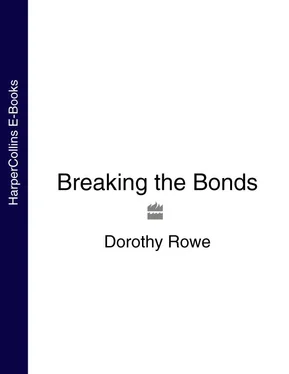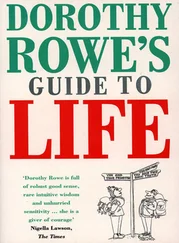DOROTHY ROWE
Understanding Depression, Finding Freedom

 Copyright
Copyright
HarperCollins Publishers Ltd. 1 London Bridge Street London SE1 9GF
www.harpercollins.co.uk
Published by Harper Press 2006
Previously published in paperback by HarperCollins 1994
Reprinted eleven times
Previously published in paperback by Fontana 1991
Reprinted two times
First published in Great Britain as The Depression Handbook by HarperCollins Publishers 1991
Copyright © Dorothy Rowe 1991
The Author asserts the moral right to be identified as the author of this work
A catalogue record for this book is available from the British Library
All rights reserved under International and Pan-American Copyright Conventions. By payment of the required fees, you have been granted the nonexclusive, nontransferable right to access and read the text of this ebook on-screen. No part of this text may be reproduced, transmitted, downloaded, decompiled, reverse engineered, or stored in or introduced into any information storage and retrieval system, in any form or by any means, whether electronic or mechanical, now known or hereinafter invented, without the express written permission of HarperCollins ebooks
HarperCollins Publishers has made every reasonable effort to ensure that any picture content and written content in this ebook has been included or removed in accordance with the contractual and technological constraints in operation at the time of publication
Source ISBN: 9780006375654
Ebook Edition © JANUARY 2017 ISBN: 9780007406791
Version: 2017-01-13
Praise for Dorothy Rowe:
‘Dr Dorothy Rowe, seer, has qualities which to my mind place her somewhere between sainthood and genius’
FAY WELDON
‘Dorothy Rowe’s books are exceptional. Rowe has not just got common sense but wisdom and real writing gifts. It’s pleasurable to read her blend of quoted poetry, proper and powerful prose and good jokes’
Observer
‘You can’t go to a party without meeting at least two people whose lives have been changed by Dorothy Rowe’
LINDA GRANT
‘Dorothy Rowe stands out among psychologists for her clear insight into human experience: her writing is refreshingly free from dubious theoretical constructs and jargon’
Independent
To Diana, Ron and Ed
Cover
Title Page
Copyright
Praise
Dedication
Preface : How to Use This Book
I The Meaning of Depression
1 An Ordinary Story
2 Depression – the Painful Isolation
3 Our Greatest Fear
Finding the Source of Our Greatest Fear
Extraverts and Introverts
Why We Need to Know Ourselves
4 Believing That We Are Not Good Enough
Drawing the Conclusion ‘I Am Bad’
Saving Our Self
Becoming An Expert in Feeling Guilty
Compensations for Believing ‘I Am Bad’
Living Our Story
5 Constructing Our Prison of Depression
How Thoughts and Images Create a Prison
How Pat Built her Prison of Depression
The Recipe for Depression
How the Six Beliefs Fit Together
II Why Is It So Hard To Change?
6 Fearing Change
7 Wanting Certainty
8 Pride
9 Taking Things Personally
10 Hanging On to Hopes
11 Other People
Ourselves and Society
Families Against Change
Partners and Power
III The Journey Out of the Prison of Depression
12 The Expert’s Secret
13 Fitting Yourself for the Journey
14 Suicide Is Not a Solution
15 What You Need to Find Along the Way
Labelling Emotions Correctly
Finding Forgiveness
The Consequences of Striving to Be Good
The World Is Neither Just Nor Unjust
Our Helplessness Is the Source of Our Strength
Changing Our Relationships with Other People
16 Leaving Loneliness Behind
Our Rules about Our Relationships
Our Beliefs about Relationships
Our Skills in Our Relationships
Our Emotions in Our Relationships
Dismantling the Barrier
Twelve Decisions
17 Helping One Another
18 Trying Something New
19 Journey’s End
IV Discoveries
20 Discoveries
Discoveries
V Technical Footnotes
21 Is Depression a Physical Illness?
The History of Depression
The Classification of Depression
What Psychiatrists Say Publicly
What Psychiatrists Say Privately
Why Psychiatrists Insist that Depression Is a Physical Illness
Why Psychologists Insist that Depression Is a Physical Illness
The Cause and Outcome of Cancer and Heart Disease
How Important Is Thinking?
What it Means to Be Told That You Have a Genetic Illness
Understanding Why
22 Drugs – Friend or Foe?
23 Choosing a Therapist
Different Kinds of Therapy
Kinds of Therapists
24 Technical Terms – Keys to the Jargon
Keep Reading
References
Index
Acknowledgements
About the Author
Also by the Author
About the Publisher
Preface How to Use This Book
‘I would rather have a physical illness – any physical illness – rather than be depressed. Depression is the worst experience a person can have.’
Anyone who knows what it is to be depressed would agree. It is not just that being depressed means feeling despairing, frightened, guilty, bitter, helpless, tired and ill. It is the most terrible sense of being trapped and alone in some horror-filled prison.
When we have a physical illness or have been injured, we can feel immersed in the pain and discomfort, but, equally, we can separate ourselves from that pain and discomfort. We can talk to other people, share a joke, take an interest in what they are doing, watch television, read a book, plan our future, and when someone shows us love, comfort and support we can feel warmed, cheered and supported, and give back in return our love and gratitude.
When we are depressed we can do none of these things. We are surrounded totally by the prison of depression. We cannot escape, even momentarily. Occasionally we can act normally. We can answer a telephone, or chat briefly to friends. We might feel slightly better in the evening or when we are at work, but all the time we know that the prison has not gone away, just eased its grip on us a little. Even when a course of antidepressant drugs (psychiatric, medical and psychological terms are explained in the section Technical Terms) or a series of ECT (electroconvulsive therapy) has made us feel more able to face life, we know that the prison is still hovering there in the background, waiting. One false word or action, one crisis, and its jaws will snap around us again, and we shall be trapped and helpless.
Читать дальше


 Copyright
Copyright










